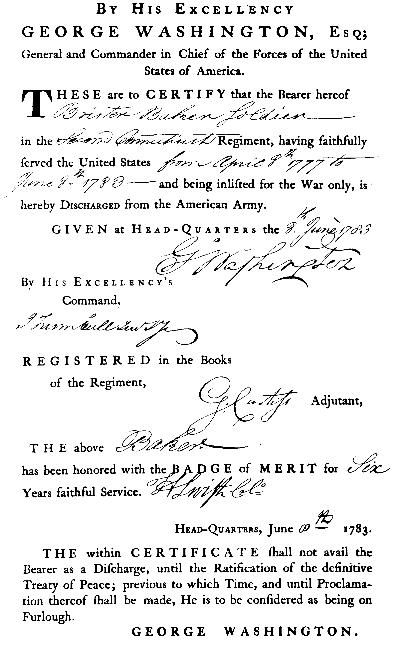Emerging from the Shadows, 1775-1819:
Blacks in the Revolutionary War |
|---|
The American Revolution was not broadly
supported by whites, and the revolutionary leaders, who
acted out of their commercial interest, found it difficult to recruit anyone else to fight for them. For
example, it was necessary to promise political rights to "Sons of Liberty" recruited from Boston workers,
and farmers in Massachusets were offered Indian land in upper New York state as a bribe. Not surprisingly,
then, especially since there was no real conviction that Blacks were inherently inferior, the white ruling
class recruited Blacks to be fighters and die for their cause.
 Connecticut was rather slow to bring Blacks into its militias, and so Blacks who sought to gain
land or freedom through the war had to join the militias in neighboring states. For example, the Black
Rhode Island Regiment fought at the important Battle of White Plains.
Connecticut was rather slow to bring Blacks into its militias, and so Blacks who sought to gain
land or freedom through the war had to join the militias in neighboring states. For example, the Black
Rhode Island Regiment fought at the important Battle of White Plains.
Shown here is the flag of the Bucks of America, c. 1786, (Courtesy of the Massachusetts Historical Society)
which was a Massachusetts unit that was almost entirely Black. At the upper left is a square with the gold
stars of the thirteen original colonies on a blue ground, and a buck is leaping near a pine tree. Many members
of this unit came from Hartford and elsewhere in Connecticut before Blacks were allowed into the
Connecticut militia.
 Copy of the Honorable Discharge for Brister Baker, 1783, from Colored Patriots of the American
Revolution, by William C. Nell. Brister Baker was a Black soldier who fought in the Second Connecticut
Regiment. The meritorious discharge notes that Baker was enlisted into the Army in April 1777 and served
six years faithfully.
Copy of the Honorable Discharge for Brister Baker, 1783, from Colored Patriots of the American
Revolution, by William C. Nell. Brister Baker was a Black soldier who fought in the Second Connecticut
Regiment. The meritorious discharge notes that Baker was enlisted into the Army in April 1777 and served
six years faithfully.
The discharge does not make note of the fact that Baker was Black, as would census records in the
next century when biological racism emerged. |
 Of course, the issues over which the War of Independence were fought was a matter of complete indifference
to Blacks because they were not involved in commerce. Consequently, there had to be rewards.
Of course, the issues over which the War of Independence were fought was a matter of complete indifference
to Blacks because they were not involved in commerce. Consequently, there had to be rewards.
Pensions were
an obvious choice, for they did not make the recipient a property owner able to vote. If the person happened
to be a slave, the obvious thing to do with his pension reward would be to assign it over to their owners to
pay for their freedom. Here is a pension receipt for the Black soldier, Gad Asher, signed with his mark on 4
March, 1795. While Asher was from New Haven at the time, his son, Jeremiah Asher, later moved to Hartford
where his descendents continued to live. |

![[Exhibit contents]](../../bin/top.gif)
![[Back]](../../bin/back.gif)
![[Forward]](../../bin/forward.gif)
|